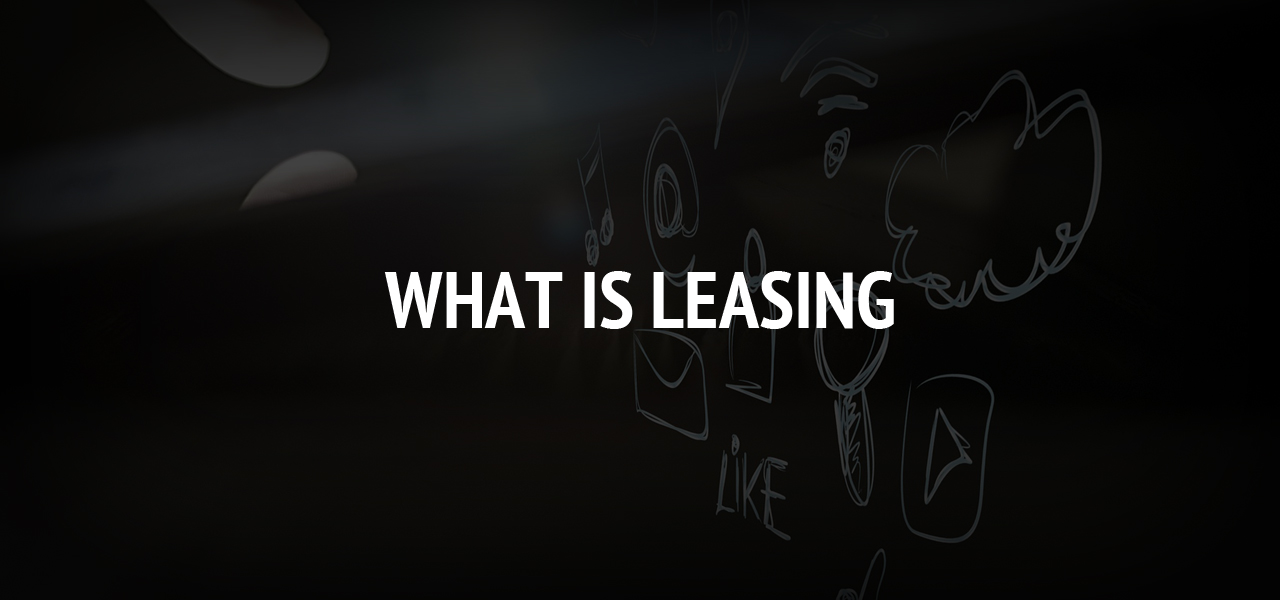What is leasing

What is leasing and how does it work
Leasing is a financial solution for businesses and individuals; a service with which you can take a long-term lease of property with the possibility of its further redemption. It looks like both a rent and an analogue of a targeted loan. The company takes the property it needs for the business and gradually pays for it, like with a loan. But the terms of payment in leasing are more flexible and can take into account the specifics of the business.
Three parties usually take part in the transaction: the lessor, the lessee and the seller of the leased asset. For example, a new hotel needs a car to carry visitors to and from the airport. There is no money for the purchase and the owner of the hotel decides to lease the car for a year. They turn to a leasing company that buys a car from a car dealer. The owner of the hotel becomes the lessee and undertakes to pay the lessor company a certain amount for the car every month.
A year later, they fully redeem the car. Moreover, the amount of monthly payments was distributed so that at the peak of the hotel season it was higher than in the off-season months. The leasing company fixes these calculations in a special program for car rental and leasing software. This is one of the advantages of this service.
The economic meaning of leasing: benefits for each party
Leasing property is a quick and profitable way to replenish the material and technical base of the company. In this case, the company immediately receives the necessary property, and not money, as is the case with a loan. Leasing is convenient. You do not need to collect a large package of documents, and the transaction is processed within a day. This is due to the fact that the leasing company does not risk anything, as it remains the owner of the property. The bank has higher risks and, accordingly, more stringent conditions.
And what about the rest of the economic benefits for each side? Let us take a look at them one by one:
Lessee:
- does not immediately spend a large amount from the budget (and in case of its absence, they do not take a loan from a bank at crazy interest);
- legal entities can be reimbursed VAT on lease payments, significantly reducing the tax burden;
- the company can attribute lease payments to expenses, automatically reducing the taxable base for income tax.
Lessor :
- receives a monthly payment from the lessee;
- if their own property is leased out, it is more profitable than using it yourself for free;
- if the client is unable to pay the lease payments, the property can be sold or re-leased;
- it is possible to receive property on more favorable terms, since the lessor is a wholesale client for the seller of property.
Property seller:
- can sell in bulk, which means they can always sell their goods;
- can get favorable terms of a deal with lessors, because any of their shares gives them the opportunity to promote and sell;
- does not support transactions, since all this lies on the shoulders of the lessor and their partners.
By the way, an insurance company that insures property or a legal company that accompanies the transaction at all stages can also participate in the transaction.
What property can be leased and what cannot
Under a leasing agreement, you can take movable and immovable property for long-term use, which retains its consumer properties for a long time. It includes:
- transport – this can be special equipment for production, fleet renewal or a car for representative purposes;
- production and trade equipment – office, IT-equipment, industrial equipment; there is even software leasing, as this is a very necessary thing, because not everyone can afford to immediately spend a large amount on its development;
- real estate on lease is chosen when it is necessary to rent an office or industrial premises; real estate can be redeemed, which is ultimately more profitable than a mortgage.
You cannot lease something that cannot be used twice: food, military equipment, raw materials, building materials, natural objects, land and equipment without a serial number. It is also forbidden to lease property that belongs to the state, such as cultural monuments and buildings. But, by the way, farmers can lease their farm: horses and cows.
Many people consider leasing to be one of the types of consumer credit. But it is not the case. First, with leasing, there is no need to make a deposit, because the leased property is the pledge of the monthly payment. Otherwise, it will simply be taken away from you. Second, leasing property is more profitable. Typically, leasing companies buy equipment in bulk, so you can buy property from them cheaper than taking out a loan.
Of course, there are some nuances, and some may still be denied leasing. Such cases are rare, but they do happen. If the leasing company discovers that the lessor company has transmitted false data, cannot, for any reason, comply with the terms of the transaction, or does not have a guarantor, then it will be refused. They are reluctant to give leasing to companies that have been on the market for less than a year. It is believed that such companies have a high risk of closing, which means they will not be able to pay.
As soon as you try to lease property one day, you will understand how much better and more convenient it is than getting bogged down in loans. Leasing allows you to purchase a car, equipment or real estate without significant one-time costs. The company can attribute leasing expenses to the company's expenses, thereby saving on paying income tax. The leasing company has its own benefits, for example, it receives income for property that it would use on its own for free. Typically, such companies keep records of transactions, so they have software for auto leasing software.
About The Author
Related Blog
View All-
How will the hybrid app development methodologies transform the app development landscape?
The world has seen an exponential and continuous growth in the mobile application development market as more firms are implementing the mobile-first mindset. Though, as user behaviors are drifting at a high pace, organizations must adapt to the changes to fulfill ...
-
6 Reasons Businesses With Mobile Apps Are More Successful
It's no secret that the average American spends a large portion of their day looking at their mobile phone. In an age where smartphones can be used for everything from GPS navigation to social media to online banking, people rarely leave home without them. ...







